Commercial HVAC Repair – Atlanta, GA
How to Choose the Right Commercial HVAC Service Provider for Your Business
When it comes to the comfort and efficiency of your business, choosing the right commercial HVAC service provider is crucial. Your HVAC system plays a vital role in maintaining the ideal temperature, air quality, and overall environment for your employees and customers. However, finding a reliable and skilled service provider is not always an easy task. Here’s a guide to help you navigate the process and make an informed decision, ensuring that your HVAC needs are met efficiently and cost-effectively.
1. Experience and Expertise Matter
When searching for an HVAC service provider, experience is key. Look for companies with a proven track record in commercial HVAC services. An experienced provider will understand the complexities of large HVAC systems and be able to handle the unique challenges that come with them. Be sure to ask about the company’s experience with systems similar to yours—whether it’s heating and air conditioning repair for office buildings, multi-story commercial spaces, or specialized HVAC systems.
2. Check for Proper Licensing and Certifications
Make sure the HVAC service provider is fully licensed and certified. Proper credentials indicate that the company adheres to industry standards and regulations. Certifications from well-known organizations such as the Air Conditioning Contractors of America (ACCA) or North American Technician Excellence (NATE) demonstrate that their technicians are well-trained and knowledgeable.
3. Look for Comprehensive Services
A good commercial HVAC service provider should offer a wide range of services, including installation, repair, and maintenance. It’s important to choose a provider who can handle all your HVAC needs, from emergency repairs to routine maintenance, ensuring that your system is always in top shape. Look for HVAC repair services that also offer preventive maintenance plans to help keep your system running smoothly and avoid costly emergency repairs in the future.
4. 24/7 Availability for Emergency HVAC Repairs
Emergencies can happen at any time, and when they do, you need an HVAC provider who is available around the clock. Whether it’s a sudden breakdown in the middle of summer or a malfunctioning heating system during the coldest months, knowing that a reliable provider offers 24/7 HVAC repair services will give you peace of mind. This is especially important for businesses that rely on consistent comfort, such as restaurants, hotels, and retail stores.
5. Reputation and Customer Reviews
Before making a final decision, research the company’s reputation. Read customer reviews and ask for references from other businesses in your area. Positive feedback is a good sign that the provider is dependable and performs high-quality work. Be sure to check online reviews or ask for testimonials related to heating and air conditioning repair near me to get a sense of how the company handles different commercial HVAC systems.
6. Energy Efficiency and Sustainability
As businesses look for ways to reduce their carbon footprint and save on energy costs, choosing a service provider who is knowledgeable about energy-efficient HVAC solutions is essential. An expert HVAC provider will be able to recommend energy-saving upgrades for your system and suggest options that align with green building certifications like LEED. This not only helps reduce your operational costs but also contributes to your business’s sustainability goals.
7. Get Multiple Quotes
Don’t settle for the first quote you receive. It’s always a good idea to request multiple estimates to compare prices, services, and warranties. Be cautious of providers offering deals that seem too good to be true—sometimes, low prices may indicate subpar quality or hidden fees. A well-priced service provider will offer transparent pricing with no surprise costs down the line.
8. Technological Capabilities
In today’s digital age, many commercial HVAC systems come with advanced technologies, including smart thermostats, sensors, and remote monitoring. Look for a provider who is familiar with modern HVAC systems and can help you integrate these technologies into your business. These systems allow for more precise temperature control, greater energy efficiency, and easier maintenance.
9. Local Expertise
Opt for an HVAC provider who is local to your area. Providers familiar with local building codes, climate conditions, and common HVAC issues in your region will offer better, faster service. You can also find heating and air conditioning repair near me by searching locally to ensure timely response times in case of emergency or routine service requests.
10. Ongoing Support and Maintenance
Finally, choose a service provider who offers ongoing support, including regular maintenance and inspection services. A well-maintained HVAC system can save you money in the long run by preventing costly repairs and ensuring your equipment operates efficiently. Ask the provider if they offer service contracts or maintenance packages that can help extend the lifespan of your HVAC system.
Conclusion
Choosing the right commercial HVAC service provider is essential for maintaining the comfort, efficiency, and productivity of your business. By focusing on experience, certifications, customer reviews, and the scope of services, you can find a reliable provider who meets your needs. Don’t hesitate to ask about their ability to handle emergency HVAC repairs and ensure you have access to 24/7 support when needed. Investing in the right provider will ultimately help your business save money, improve comfort, and operate more efficiently.
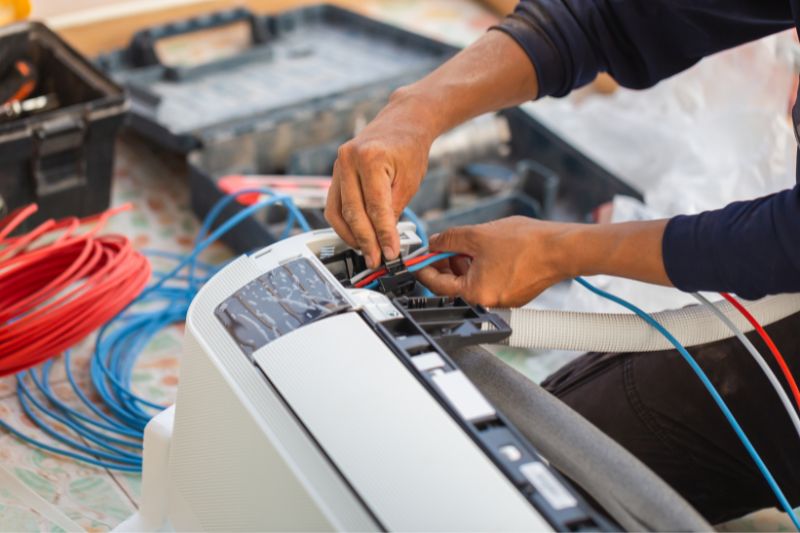
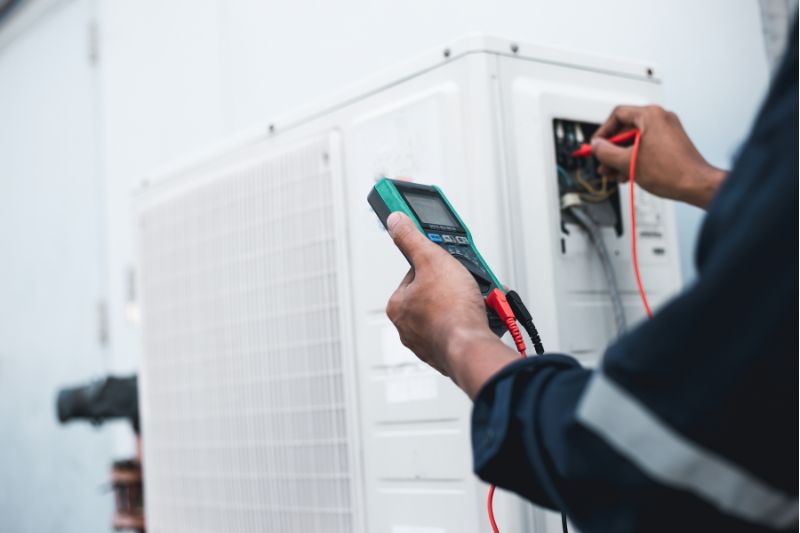
Got Questions? Call Now To Get Answers
The Role of Preventive Maintenance in Extending the Life of Commercial HVAC Systems
Commercial HVAC systems are critical to the comfort and productivity of any business. Whether you’re operating a restaurant, office building, or retail store, ensuring that your HVAC system runs efficiently is essential for creating a comfortable environment. However, without proper care, HVAC systems can experience premature breakdowns, leading to costly repairs or even complete system replacements. Preventive maintenance plays a pivotal role in extending the life of your commercial HVAC system, saving you money, and avoiding disruptions to your business operations. Here’s why regular maintenance is so important and how it can prevent the need for expensive air conditioning repair and heating repair services.
1. Maximizing Efficiency
A well-maintained HVAC system operates more efficiently, which means it consumes less energy to maintain the desired temperature. Preventive maintenance involves regularly cleaning filters, checking refrigerant levels, inspecting ducts for leaks, and ensuring that all components are functioning properly. These steps prevent the system from working harder than necessary, reducing wear and tear on components and extending the lifespan of the system. By improving efficiency, you also lower energy bills and reduce the risk of needing costly air conditioning repair or heating repair services in the future.
2. Early Detection of Potential Issues
One of the most significant benefits of preventive maintenance is the early detection of problems before they escalate into expensive repairs. HVAC technicians perform thorough inspections during maintenance visits, looking for signs of wear, leaks, and other potential issues. Catching these problems early on means you can address them promptly, often before they cause significant damage or system failure. Regular maintenance reduces the likelihood of unexpected breakdowns, reducing your reliance on emergency air conditioning repair or heating repair services.
3. Improved Indoor Air Quality
The quality of air inside your business is essential to the health and productivity of your employees and customers. Over time, dust, dirt, and allergens can build up in your HVAC system, particularly in the ducts and filters. This can lead to poor indoor air quality, which can affect the comfort and well-being of everyone in the building. Regular preventive maintenance, such as cleaning and replacing filters, ensures that your HVAC system circulates clean air. By addressing air quality issues early on, you can reduce the need for expensive air conditioning repair and improve the overall atmosphere of your business.
4. Preventing Costly Repairs and Downtime
A well-maintained HVAC system is less likely to experience sudden, unexpected failures. By having a routine preventive maintenance plan, you can reduce the chances of major malfunctions and expensive repairs. For example, ensuring that your system’s coils are clean and the condenser is working properly can prevent costly breakdowns that might otherwise require urgent heating repair services or air conditioning repair. Moreover, preventive maintenance can help prevent downtime in your business, which can occur when HVAC systems fail unexpectedly.
5. Ensuring Consistent Performance Year-Round
A commercial HVAC system has to perform reliably in different seasons, providing cooling in the summer and heating in the winter. Preventive maintenance ensures that the system is prepared for the demands of both seasons. In the colder months, maintaining the heating system can prevent issues like blocked airflow or failing heat exchangers. In the summer, keeping the air conditioning components clean and well-maintained ensures efficient cooling. Consistent maintenance helps your HVAC system meet the demands of each season without struggling or overworking itself, minimizing the need for emergency repairs.
6. Prolonging the Lifespan of Your System
The average lifespan of a commercial HVAC system is typically between 10 to 15 years, but this can vary depending on the brand, usage, and maintenance practices. Regular preventive maintenance can significantly extend the life of your system, potentially saving you from having to replace it prematurely. By investing in routine checks and addressing small issues before they grow, you ensure that your system continues to run efficiently for as long as possible, delaying the need for a costly air conditioning repair or complete system replacement.
7. Protecting Your Investment
Your HVAC system represents a significant investment, and ensuring that it lasts as long as possible is crucial to getting the most out of your initial purchase. Preventive maintenance protects that investment by keeping the system in top condition. Regular inspections and tune-ups help avoid major repairs, preserve the value of the system, and maintain its ability to perform effectively for years to come.
Conclusion
Preventive maintenance is essential for extending the life of your commercial HVAC system. By scheduling regular inspections and addressing minor issues before they become major problems, you can ensure that your HVAC system runs efficiently, reduces energy consumption, improves indoor air quality, and avoids costly emergency repairs. Not only does it reduce the need for heating repair services and air conditioning repair, but it also ensures your system is always ready to handle the demands of each season, keeping your business running smoothly year-round. Whether you need routine maintenance, urgent repairs, or full system replacements, working with a reliable HVAC provider will help protect your business’s comfort and investment in the long run.
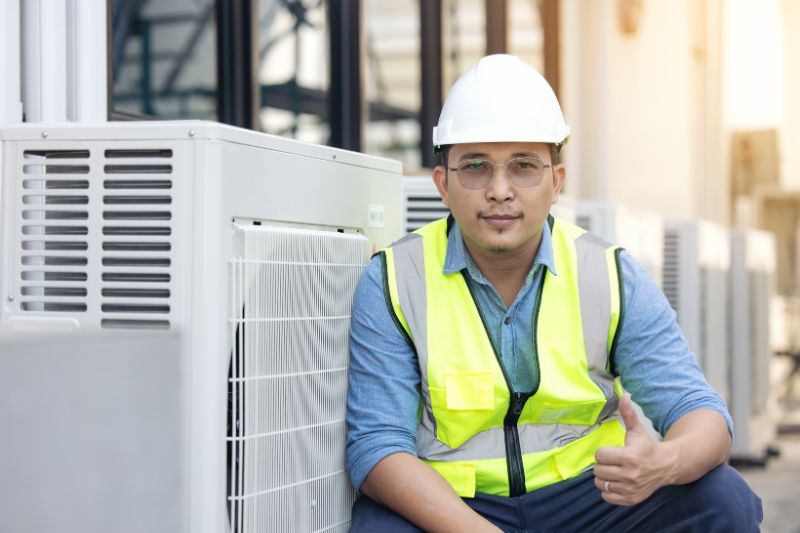
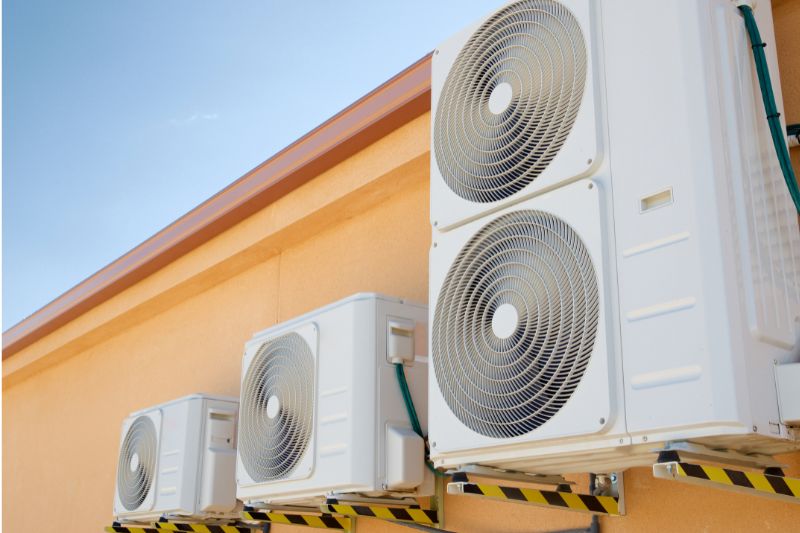
Got Questions? Call Now To Get Answers
Energy Efficiency Upgrades for Commercial HVAC Systems: Saving Money While Reducing Your Carbon Footprint
In today’s business environment, efficiency is key. Not only does optimizing energy use help reduce operational costs, but it also aligns with sustainability goals by minimizing your carbon footprint. One of the most effective ways to achieve both goals is through energy efficiency upgrades for your commercial HVAC systems. These upgrades can improve system performance, reduce energy consumption, and contribute to long-term savings, all while helping your business stay eco-friendly. Let’s explore some key energy efficiency upgrades for commercial HVAC systems, and how they can help you save money while contributing to a healthier planet.
1. Upgrade to a High-Efficiency HVAC System
One of the most significant upgrades you can make to improve the energy efficiency of your commercial HVAC system is replacing your old unit with a high-efficiency model. Modern HVAC systems are designed with advanced technology that allows for better energy management, improved heat transfer, and overall higher efficiency. These systems consume less energy to provide the same level of heating or cooling as older models, which can lead to significant savings on your energy bills.
When selecting a high-efficiency system, look for models with a high SEER (Seasonal Energy Efficiency Ratio) rating for cooling and a high AFUE (Annual Fuel Utilization Efficiency) for heating. These ratings indicate how efficiently the system converts energy into heating or cooling. Upgrading to a more efficient system can also reduce the frequency of residential heating repair services by increasing the reliability of your system.
2. Install Programmable Thermostats and Smart Controls
Installing programmable thermostats or integrating smart controls into your HVAC system can dramatically increase efficiency by allowing for better temperature management. These devices allow you to set heating and cooling schedules based on when the building is occupied, reducing energy usage when spaces are unoccupied.
For example, during non-business hours, the system can automatically reduce heating or cooling to save energy. In commercial spaces, this can translate into substantial savings. Similarly, for residential heating, smart thermostats can help homeowners regulate their system more efficiently, reducing unnecessary heating and lowering overall utility costs.
3. Regular HVAC System Maintenance
A well-maintained HVAC system runs more efficiently than one that is neglected. Regular maintenance, such as cleaning filters, checking refrigerant levels, inspecting ducts for leaks, and lubricating moving parts, ensures that the system operates optimally and doesn’t waste energy. This preventive care extends the life of your system and reduces the need for costly residential heating repair services.
For commercial HVAC systems, routine maintenance not only increases efficiency but also reduces the risk of breakdowns, helping avoid expensive emergency repairs. A maintenance plan that includes seasonal inspections can ensure that your system is prepared for the demands of each season, whether it’s the winter heating season or the summer cooling season.
4. Seal Ductwork and Insulate Pipes
Duct leaks can lead to significant energy losses in HVAC systems, especially in commercial buildings where ductwork is often extensive. Sealing ducts and properly insulating them helps prevent air loss and keeps your HVAC system working more efficiently. Similarly, insulating exposed pipes in the system can help reduce energy waste caused by temperature loss, particularly in colder months.
In commercial HVAC systems, ensuring that ducts and pipes are properly sealed and insulated can drastically reduce heating and cooling demands, saving money in the long run. This kind of upgrade can also lower the need for residential heating repair, as properly insulated ducts are less likely to suffer from wear or damage caused by temperature extremes.
5. Upgrade to Variable Speed Motors
Traditional HVAC systems use single-speed motors that operate at a fixed speed regardless of the demand for heating or cooling. In contrast, variable speed motors adjust their speed depending on the needs of the space, leading to significant energy savings. These motors can run at slower speeds when less heating or cooling is required, consuming less energy while maintaining comfort levels.
Upgrading to variable speed motors in both commercial and residential HVAC systems can lead to more consistent temperatures, fewer energy spikes, and a reduction in overall energy use. For residential systems, this upgrade can reduce the need for heating repair services by preventing overwork and extending the lifespan of the system.
6. Use Zoned HVAC Systems
Zoned HVAC systems divide a building into separate zones, each with its own temperature control. This allows you to heat or cool different areas of the building based on actual usage, rather than conditioning the entire space to the same temperature. In commercial settings, this can significantly reduce energy consumption, as areas that aren’t being used don’t need to be heated or cooled.
For example, if you’re operating a commercial office with different departments, you can control the temperature in each department independently, preventing wasted energy. Similarly, zoning in residential heating allows homeowners to save energy by targeting only the rooms that need heating, which cuts down on unnecessary usage and lowers utility bills.
7. Consider Renewable Energy Integration
For businesses looking to make a big impact on both energy savings and their carbon footprint, integrating renewable energy sources like solar panels can work hand-in-hand with your commercial HVAC system. Solar power can be used to supplement your HVAC system, especially in the warmer months, reducing dependence on traditional energy sources.
In the long term, renewable energy integration can provide a significant return on investment, lowering energy bills and potentially making your business eligible for tax incentives and rebates. For residential heating, incorporating solar panels can help offset the cost of heating during the colder months, aligning with sustainability goals and reducing your home’s environmental impact.
Conclusion
Energy efficiency upgrades for commercial HVAC systems not only help reduce operational costs but also contribute to a more sustainable and eco-friendly business. From upgrading to high-efficiency systems and installing smart thermostats to maintaining regular HVAC care and implementing energy-saving techniques like zoning and duct sealing, these upgrades have a profound impact on your bottom line. In addition, the principles of energy efficiency in commercial systems can be applied to residential heating, offering homeowners the same benefits in cost savings and environmental impact reduction. Whether you’re looking to improve the energy efficiency of a commercial building or your home, investing in these upgrades is a win-win for both your wallet and the planet.

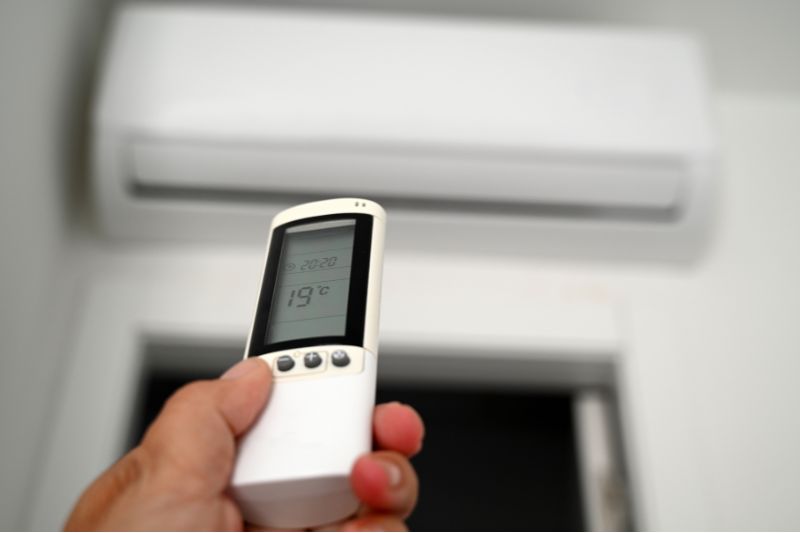
Got Questions? Call Now To Get Answers
Understanding Commercial HVAC System Design: Why Proper Sizing is Crucial
When it comes to the comfort and efficiency of a commercial building, few systems are as important as the HVAC (Heating, Ventilation, and Air Conditioning) system. A well-designed HVAC system not only ensures that a building remains comfortable throughout the year, but it also plays a vital role in energy efficiency, indoor air quality, and system longevity. One of the most important factors in HVAC system design is proper sizing. Installing a system that is either too large or too small for the space it serves can lead to a range of problems, from increased energy consumption to frequent repairs.
In this article, we will explore why proper sizing of commercial HVAC systems is crucial, how it affects performance, and what business owners need to consider during the design and installation process.
What Is Proper Sizing in HVAC?
Proper sizing refers to selecting an HVAC system that is appropriately matched to the size, layout, and unique needs of a commercial space. The size of an HVAC unit is typically measured in tons (for cooling capacity) or BTUs (British Thermal Units, which measure heating capacity). A unit that is too small will struggle to meet demand, while one that is too large will cycle on and off too frequently, leading to inefficiency.
To properly size an HVAC system for a commercial building, factors such as the building’s square footage, insulation quality, number of occupants, and specific heating or cooling requirements must be taken into account. A professional HVAC repair service can help ensure that the correct system is chosen during the installation process.
Why Is Proper Sizing Crucial for Commercial HVAC Systems?
1. Energy Efficiency and Cost Savings
A system that is too large or too small will be less energy-efficient, leading to higher utility bills.
– Oversized systems can cause energy waste because they cool or heat too quickly, resulting in the system turning on and off frequently (also known as “short cycling”). This short cycling wastes energy, increases wear and tear on the system, and can lead to frequent repairs.
– Undersized systems will have to run continuously to keep up with the demand, leading to overuse and excessive energy consumption. This can not only drive up your energy bills but also put additional strain on the system, leading to potential breakdowns and the need for frequent commercial HVAC repair.
Properly sized systems are designed to run efficiently and keep energy consumption in check, which directly translates to cost savings. This is especially important for businesses looking to reduce their operating expenses and improve their bottom line.
2. Improved Comfort and Consistent Temperatures
An oversized or undersized HVAC system will struggle to maintain consistent temperatures throughout the building. This can result in areas that are too cold or too warm, creating an uncomfortable environment for employees, customers, or tenants.
Proper sizing ensures that the system can maintain the desired temperature without excessive fluctuations. This helps create a more comfortable and productive environment, whether you’re managing an office building, retail space, or industrial facility.
3. Longer System Lifespan
Just like any complex machinery, an HVAC system operates most efficiently when it is properly sized. Oversized systems, by frequently turning on and off, cause more wear and tear on components like the compressor, fans, and motors. On the other hand, undersized systems will be overworked, leading to premature breakdowns.
Proper sizing reduces the likelihood of unnecessary stress on the system, which can extend the lifespan of the unit and reduce the frequency of repairs. Regular commercial HVAC service and maintenance are also crucial to ensuring the system continues to perform optimally for years to come.
4. Better Indoor Air Quality
An oversized or undersized HVAC system may struggle to circulate air properly, which can lead to poor indoor air quality. This is particularly important in commercial buildings where good air quality is vital for the health and well-being of employees and customers. When an HVAC system is properly sized, it can maintain optimal airflow, helping to filter out pollutants and provide clean, fresh air.
5. Reduced Environmental Impact
When your HVAC system operates at peak efficiency, it reduces the amount of energy used, leading to a decrease in overall carbon emissions. This is especially important for businesses looking to reduce their environmental footprint. Properly sized HVAC systems help businesses contribute to sustainability goals while keeping their energy consumption low.
How to Ensure Proper Sizing of Your Commercial HVAC System
1. Consult with an Experienced HVAC Professional
The best way to ensure that your HVAC system is properly sized for your commercial space is to consult with a professional HVAC contractor. They will conduct a thorough load calculation to determine the correct capacity for your system. This calculation takes into account factors such as insulation, the number of windows, and the building’s orientation relative to the sun, which all affect heating and cooling demands.
2. Consider Future Growth
If your business plans to expand in the near future, it’s important to factor this growth into your HVAC design. Installing a system that is slightly larger than what is needed at the time of installation can accommodate future growth without the need for an entirely new system. However, this should be done carefully, as installing too large of a system can lead to inefficiency.
3. Plan for Zoning
In larger commercial buildings, zoning allows you to divide the space into different temperature-controlled areas. Properly sizing the system for each zone ensures that each area gets the appropriate amount of heating or cooling, without wasting energy. Zoning systems also help improve comfort and efficiency by only conditioning spaces that are in use.
4. Prioritize Energy Efficiency
When selecting an HVAC system, look for high-efficiency models that meet or exceed local energy efficiency standards. This can help reduce energy consumption and operational costs, while also contributing to a more sustainable business model.
Conclusion
Proper sizing of commercial HVAC systems is essential for maintaining efficiency, comfort, and system longevity. When designing an HVAC system for your commercial space, it’s important to work with experienced professionals who can perform accurate load calculations and select a system that fits your specific needs. By investing in the right-sized HVAC system, businesses can reduce energy costs, improve indoor air quality, enhance comfort, and extend the life of their HVAC units. Don’t overlook the importance of regular HVAC maintenance and professional repair services to keep your system running at peak performance for years to come.
Got Questions? Call Now To Get Answers
Reach Us
Heating and Air Conditioning Repair – Atlanta, GA
(404) 348-2709
Hours of Operation
Mon Open 24 hours
Tue Open 24 hours
Wed Open 24 hours
Thu Open 24 hours
Fri Open 24 hours
